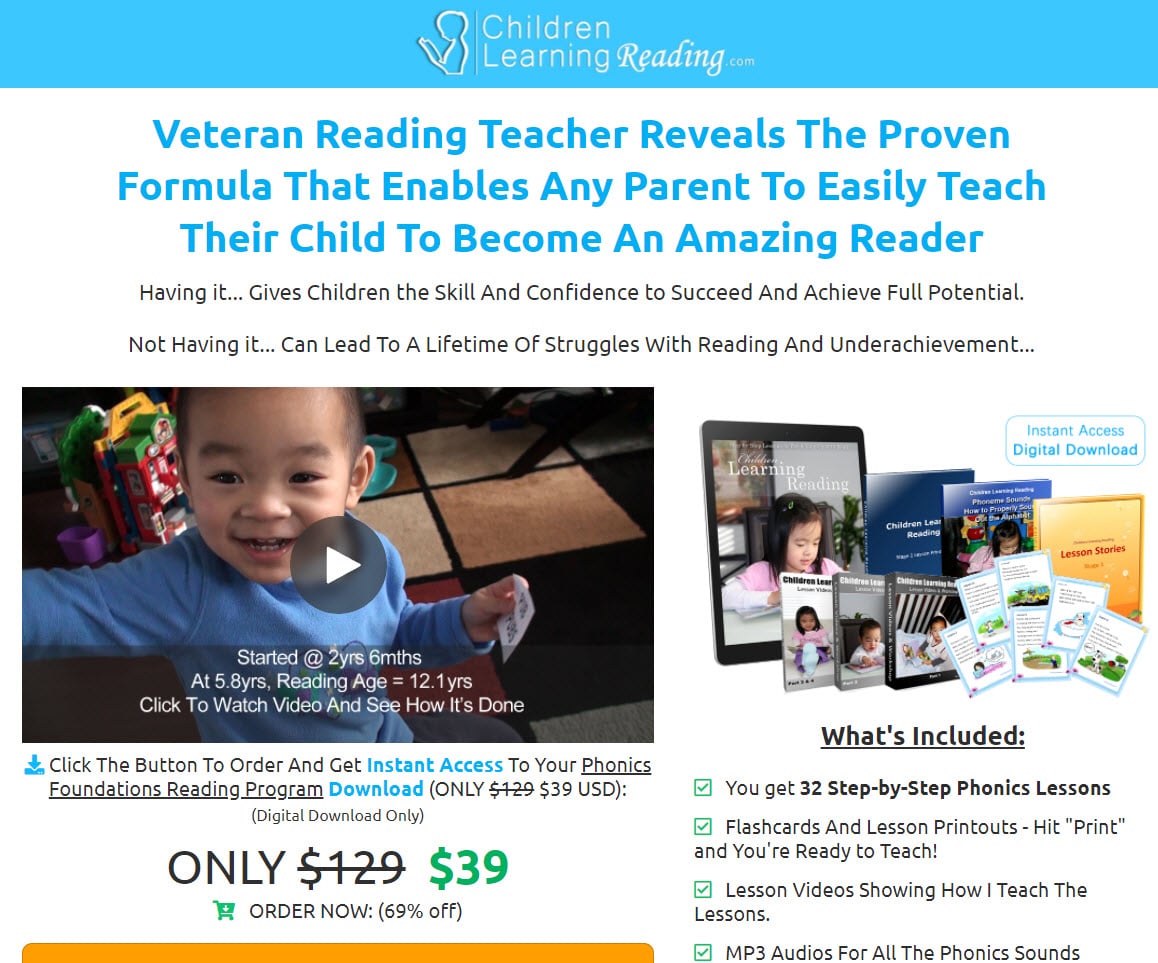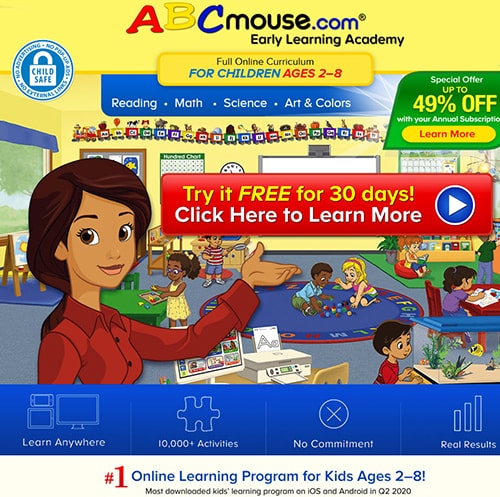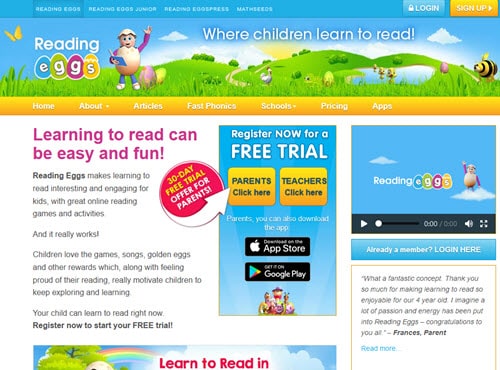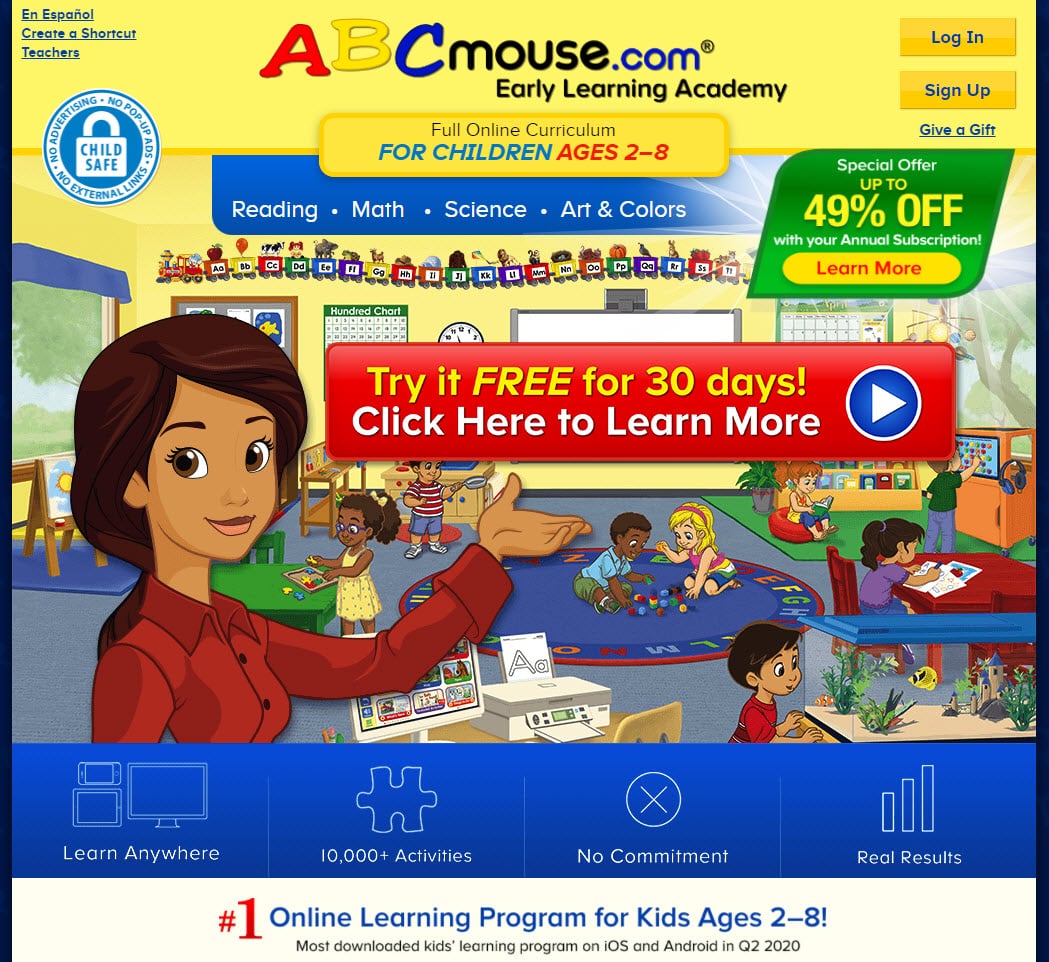At Home Reading Programs: What is Best for Struggling and Early Readers
Every day, thousands of children struggle with reading because they don’t have access to the right resources or learning programs.
I’m sure you understand the importance of early intervention in helping kids reach their potential in school and other areas. Too often, parents are left alone, searching for at-home reading programs for their struggling, early and poor readers.
This post will give you information on the most effective at-home reading programs to help your child reach their potential and become better readers.

Best Rated
See the Best Rated Reading Program
Take Quiz
Discover the ideal reading program for you & your child
Read this article
Continue reading the article
Home-based reading programs for struggling readers
The best reading programs are designed to help struggling readers overcome their reading challenges.
This is especially true for elementary school children struggling to get to grips with reading.
In fact, hundreds of studies have shown that children who engage in reading activities at home with their parents develop into better readers than those who don’t. This is because they are practicing essential reading skills and building a foundation for a love of reading.
Most importantly, they benefit from individualized instruction and parental support crucial to improving their reading skills.
In addition, home reading programs are often more affordable than other tutoring services.
Many great at-home reading programs help poor readers build these skills and get ahead in their education.
Countless online and offline reading programs are on the market, making it difficult to determine which is the best for struggling readers.
However, research-based programs focusing on phonemic awareness and phonics instruction have proven to be the most successful. They also make it easy for parents to implement the program with their children.
What is the most effective home-based learning-to-read program?
There are a few things to remember when looking for a reading program that best suits your child.
- First, it should be short and to the point; most programs work best when they are not too drawn out.
- Second, finding one tailored to your child’s specific needs is essential to maximize results.
- Third, the program should be interactive and fun so your child will enjoy participating.
Finally, it is essential that the program is easy to follow and incorporates different activities into the routine so that it becomes a regular part of your day-to-day life.
The Children Learning Reading Program
The Children Learning Reading program is the most effective home-based reading program.
It’s a highly successful, offline, home-based reading program that helps your child learn to decode printed text quickly and develop phonemic awareness. This, in turn, will help them read fluently. The program is simple, straightforward, and step-by-step, making it easy for you and your child to follow.
The Children Learning Reading program is designed to be taught to your child in two stages. Stage 1 helps your child develop all the critical foundational skills.
In contrast, Stage 2 lessons deal with slightly more advanced lessons helping to significantly advance your child’s developing reading skills from stage 1.
The step-by-step lessons are designed to be quick and effective so that the reader can make progress in a short amount of time. Home-based reading programs are generally most effective when short and to the point.
The program has been proven to be the most effective home-based reading program currently available.
Best online reading programs for struggling and poor readers
Online reading programs are software that helps students with their reading skills.
The programs track the student’s progress and provide exercises and lessons tailored to the student’s needs.
The benefits of using online reading programs
Online reading programs are becoming more popular as they offer a fun and immersive experience that helps struggling readers learn. The programs use multimedia elements, such as videos and games, to keep the learner engaged. Additionally, many of these programs are free or low-cost, making them accessible to a broader range of students.
They are interactive, with lessons, games, songs, and stories that make it fun for kids to learn and progress. These programs can help them catch up with their classmates and improve their reading skills.
Most online reading programs for struggling readers are very effective. They offer a fun, immersive experience that helps learners quickly improve their reading skills.
The immersive and fun online experience helps learners learn in a more relaxed environment, which benefits those who find traditional schooling overwhelming.
Despite their popularity, they should not be used as a replacement for a traditional reading program. Instead, they should be used in conjunction with an offline reading program that requires parental attention and instruction. This combination will help struggling readers and ensure they make the most progress.
There are several excellent online reading programs for struggling readers. ABCMouse, Book Adventure, and Reading Eggs are the top three programs that are most helpful for early and poor readers.
These programs offer a variety of activities and lessons that can help children improve their reading skills.
1. ABCmouse: A great early reading program
ABCmouse is an online reading program for struggling readers.
It features various activities, games, and books to help children improve their reading skills. The program is designed for children aged 3-8, but it can also be used by older children.
Features
ABCmouse features a wide range of activities, games, and books to help children improve their reading skills.
The program includes:
- It’s a comprehensive online reading program that can be tailored to fit the needs of any struggling reader. With more than 850 lessons in ten levels, it provides plenty of material for your little ones to improve their reading skills.
- A variety of games and activities to help children practice their reading skills
- Progress tracking so parents can see how their child is progressing
- A rewards system to motivate children to keep using the program
Pricing:
ABCmouse costs $12.99 per month or $59.99 per year. There is also a 30-day free trial available, so you can try the program before you buy it.
2. Reading Eggs – One of the best online websites for reading
Reading Eggs is an online reading program for kids aged 2-13.
It features over 2,500 ebooks, interactive games, and activities. The program is designed to help kids learn to read through a multi-sensory approach.
Features
Some of the features of Reading Eggs include:
- Over 2,500 ebooks: The program includes a wide selection of ebooks for kids to read. There are books at different levels, so kids can find appropriate ones for their skill level.
- Interactive games and activities: The program includes various interactive games and activities that help kids learn to read. These include phonics games, sight word games, and comprehension quizzes.
- Reading Eggs covers the five essential components of reading success: phonics, phonemic awareness, vocabulary, fluency, and comprehension.
Pricing:
Reading Eggs costs $9.99 per month for up to 4 children.
There is also a free trial available that allows you to try the program for 30 days.
3. Book Adventure: Pre-k online reading comprehension programs
Book Adventure is an online reading program that helps struggling readers improve their reading skills.
The program provides readers with a list of books to read and then quizzes them on what they have read. Readers who do well on the quizzes are rewarded with points, which they can use to buy virtual prizes.
Features
Book Adventure includes numerous features that make it an effective tool for helping struggling readers improve their skills. Some of these features include:
- A wide selection of books: Book Adventure includes a library of over 40,000 books, so there is sure to be something for every reader.
- Quizzes on what you have read: Readers take a quiz on what they have just read after reading a book. This helps to ensure that they understand the material.
- Rewards for doing well: Readers who do well on the quizzes are rewarded with points, which they can use to buy virtual prizes. This incentive encourages them to keep reading and improving their skills.
Reading programs for struggling readers in elementary school
There are many different reading programs for struggling readers in elementary school.
Some of these programs focus on teaching phonics and other essential reading skills. In contrast, others may use more creative methods such as storytelling or drama to help children engage with the material.
At-home reading programs can be an essential supplement to these classroom-based programs, providing extra practice and reinforcement for struggling readers.
Why are at-home reading programs important for a child in elementary school:
At-home reading programs allow struggling readers to practice their skills in a more relaxed setting. They also give parents and caregivers a chance to be more involved in their child’s education and to support them as they learn to read.
Early intervention can make all the difference in whether or not a child becomes a struggling reader for life. Many programs, both online and offline, can help your child improve their reading skills.
What most successful reading help programs have in common
Many different reading programs are available, but not all are created equal.
To be successful, a reading program needs to address five critical areas:
- Phonemic awareness – the ability to hear, identify, and manipulate individual sounds in spoken words.
- Alphabetic principle – the understanding that there is a relationship between letters and sounds and that these can be used to read and spell words.
- Fluency – the ability to read with speed, accuracy, and proper expression.
- Vocabulary – the knowledge of words, including their meanings, pronunciations, and spelling.
- Comprehension – the ability to understand what is read.
Programs that focus on just one or two of these areas are likely less effective than programs that focus on all five.
Most successful reading programs use systematic and explicit instruction, which means that essential features of an example or demonstration are drawn to the student’s attention.
Several important characteristics of systematic instruction include:
- Teaching skills and concepts in a planned, logically progressive sequence
- Emphasizing clearly defined objectives
- And assessing student skill retention and acquisition through multiple practice activities and assessments.
Research-based reading programs for struggling readers
Research-based literacy programs are those that have been proven to be effective in helping struggling readers improve their skills.
These programs typically use various techniques, including phonics instruction, to help children learn to read.
There is no one perfect reading program that will work for every struggling reader.
However, many programs have components that, when matched with a student’s individual needs, can be combined and implemented in ways that result in reading growth. As each program is different, it is crucial to research the available options and find the program that best meets your child’s needs.
When selecting a research-based literacy program for your child, there are many things to remember.
First, you will want to ensure that the program is based on proven instructional methods.
Then, you’ll want to choose a program that is appropriate for your child’s individual needs.
Finally, you will want to select an affordable and convenient program for your family.
Research has shown that children participating in these programs significantly improve their reading skills. In addition, these programs can help to prevent reading difficulties from becoming long-term problems.
By selecting a program that is based on research, parents give their children the best chance for success.
What else can parents do at home to help with reading, fluency, and comprehension skills?
- Read to your child every day. This is one of the most important things you can do to help your child develop reading skills.
- Help your child sound out words and read simple books together.
- Encourage your child to read on their own for pleasure, and provide them with plenty of age-appropriate reading material such as picture books, story books, and easy chapter books.
- Talk about what you’re reading together as a family. This will help build your child’s interest in and enjoyment of reading.
- Make a game out of it! Turn everyday activities into opportunities to practice reading skills—read street signs, cereal boxes, or recipes while you cook dinner together.
Choose a reading program to help your child learn to read
Various at-home reading programs are available to help struggling, early, and poor readers.
While some programs are more effective, finding a program that works for your child is the most important thing. With some research, you can find an at-home reading program to help your child progress in reading fluency and comprehension.

Natalie is a full-time blogger and former elementary school teacher who specializes in helping parents teach their kids to read. With a qualification in Early Childhood Education, over 7 years of experience in education, and a passion for literacy, Natalie provides practical tips, activities, and resources for parents looking to support their child’s learning-to-read journey. She is the proud mom of two young readers and loves sharing her knowledge and experience with other parents. Natalie enjoys spending time with her family, reading, and exploring the great outdoors when she’s not blogging.



















